Signal vs Telegram: Which App Should You Choose for Privacy and More?
In a world where a “private chat” can turn into public knowledge faster than you can hit send, picking the right messaging app has become the #1 thing on everyone’s agenda. And that’s exactly where the Signal vs. Telegram showdown gets real. Both claim to be fortresses of privacy, but let’s cut through the noise: which one actually keeps your secrets safe? Let’s find out.
In this article, we’ll break down how each app stacks up in terms of encryption, data handling, user privacy, and more, so you can make a well-informed choice. And if you’re looking to take your privacy even further, we’ll show you how pairing your app with a powerful VPN like VeePN can be a game-changer.

Why messaging privacy matters in 2025
Going through 2025, messaging privacy isn’t just a buzzword, but a necessity people can’t afford to ignore. That’s because the stakes have never been higher. Every time you send a message online, you’re putting your personal information at risk. Casual conversations, business talks, political activism, your digital dialogues are all vulnerable to prying eyes.
Governments are stepping up their surveillance efforts in the name of national security. Tech companies are collecting more metadata than ever to fuel targeted ads. Your internet service provider can log your online activity and sell it to third parties. That’s like having a private conversation on a public street. Or in a crowded office. Where anyone can overhear.
The problem is, not all “secure” apps are created equal. Some offer basic encryption, but still store your metadata. Others claim to be private but have backdoors for law enforcement or store your messages on cloud servers. To really protect your data, you need to look beyond the surface. That’s why Signal and Telegram are worth a closer look.
Your messages, no matter how mundane, should be yours alone. As digital threats get more sophisticated, taking control of your privacy isn’t just smart, it’s essential. Choosing the right app is just the first step. With that in mind, let’s dive into the Signal vs. Telegram battle and see which one truly has your back when it comes to private chats.
Overview of Signal
Signal stands out as one of the most secure encrypted messaging apps that protects user communication. The Signal Foundation established Signal as a non-profit company to build an application with privacy as its core design principle, which remains its central mission to this day. The platform differs from other services because it operates without data collection, profile building or advertisement serving. The platform serves only one function, which is to safeguard communication activities:
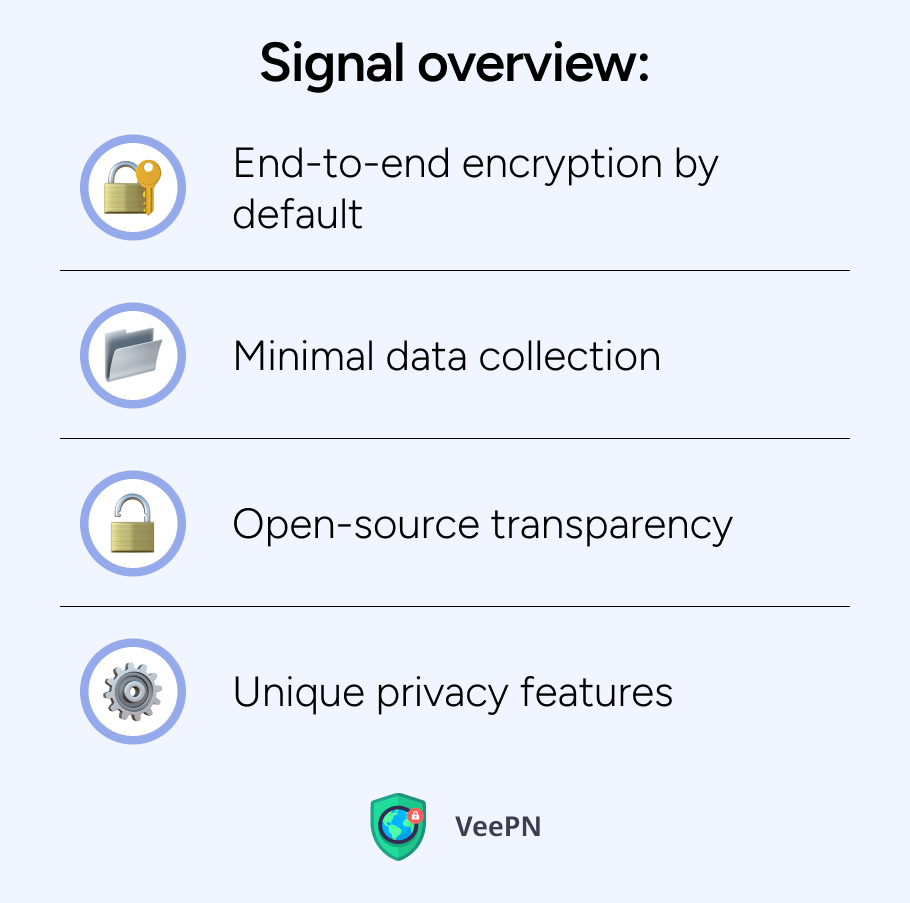
💬End-to-end encryption by default. The main strength of Signal comes from its default implementation of end-to-end encryption for all messages, together with calls. The system ensures that messages and calls remain private between senders and recipients because Signal, Internet providers and third parties lack access to the shared information. Signal implements the Signal Protocol, the highest standard for secure messaging according to experts.
💬Minimal data collection. Signal collects virtually no user data. It doesn’t ask for your name, doesn’t track your contacts, and doesn’t log message metadata. The only thing tied to your account is your phone number and even that can be hidden using features like registration lock or masked phone numbers through third-party services.
💬Open-source transparency. Unlike some competitors, Signal’s codebase is fully open-source. This allows independent experts to regularly audit and review the app for potential vulnerabilities. It also means there are no hidden functionalities: what you see is what you get.
💬Unique privacy features. Beyond its strong encryption, Signal offers privacy-centric tools like disappearing messages, screen security (which blocks screenshots), and incognito keyboard support. You can also blur faces in photos, auto-lock the app, and set relay calls through Signal servers to hide your IP address during voice calls.
Who is Signal for?
Signal stands as the main communication platform for journalists and whistleblowers who value privacy yet provides equally strong benefits for regular users. Users who seek privacy in their messages alongside a simple interface should choose Signal because it provides complete data protection.
Overview of Telegram
Telegram has positioned itself as a privacy-conscious alternative to mainstream messaging apps, with a focus on speed, functionality and cloud-based convenience. With over 700 million active users, it’s one of the most popular communication platforms out there, but when it comes to real privacy, Telegram is more complex than it seems:
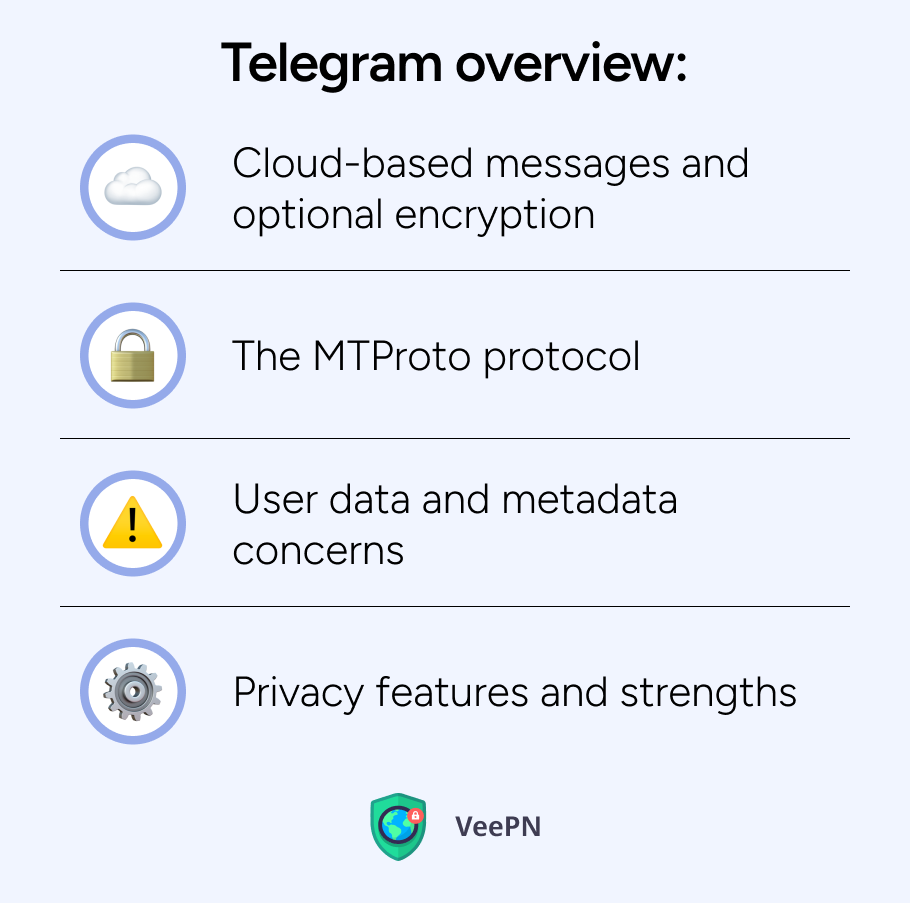
💬Cloud-based messages and optional encryption. Telegram’s biggest differentiator is its cloud-based architecture. This makes it super fast and convenient for syncing messages across multiple devices. But this design choice comes at a privacy cost: regular chats are not end-to-end encrypted. Instead, they are stored on Telegram’s servers and encrypted in transit, so Telegram itself has access to them. Only Secret Chats on Telegram are end-to-end encrypted, and these must be initiated manually. Secret Chats are device-specific, so messages won’t sync across devices and are deleted when the chat ends or when you choose to set them to self-destruct.
💬The MTProto protocol. Telegram uses a custom-built protocol called MTProto for its encryption. While MTProto 2.0 has been improved over time, it’s still not fully open-source, unlike the Signal Protocol. This makes it harder for independent security researchers to audit it thoroughly and confirm its integrity.
💬User data and metadata concerns. Telegram collects more data than Signal, including IP addresses, contact lists and metadata about your interactions. While Telegram claims to store this data securely and only release it under specific legal circumstances, it’s still a concern for users who want complete anonymity.
💬Privacy features and strengths. Despite some concerns, Telegram has many privacy features that will appeal to security-concious users. These include disappearing messages (even in non-secret chats), self-destructing media, two-step verification, username-based communication that doesn’t require you to share your phone number. It also supports large groups (up to 200,000 members), public channels and bot integrations, so it’s very versatile.
Who is Telegram for?
Telegram is for users who want a feature-rich messaging platform with a focus on speed, scalability and group interactions. It’s great for casual users, content creators and communities, but for those who prioritise end-to-end encrypted privacy, Telegram requires careful configuration and awareness of its limitations.
Side-by-side comparison: Signal vs Telegram security
Now that we’ve examined both apps individually, let’s compare Signal messenger and Telegram directly on the privacy and security features that matter most. Our breakdown lays it all out — where each app excels and where it might just drop the ball.
🔒 End-to-end encryption
- Signal: End-to-end encryption is enabled by default for all messages, calls, and media. Even Signal cannot read your messages.
- Telegram: Only Secret Chats are end-to-end encrypted. Standard chats (including group chats) are stored on Telegram’s servers and encrypted only during transmission.
📊 Metadata collection
- Signal: Stores almost no metadata. It doesn’t record who you messaged, when, or for how long.
- Telegram: Collects more metadata, including IP addresses, contact syncing, and interaction logs.
🗄️ Data storage
- Signal: Stores messages only on your device, not in the cloud. No backups unless you enable local encrypted ones.
- Telegram: Stores messages in the cloud by default, allowing easy multi-device syncing, but at the cost of giving Telegram access to those messages.
🧪 Open-source transparency
- Signal: Fully open-source, including both app and encryption protocol. Trusted and widely reviewed by security experts.
- Telegram: App code is open-source, but the MTProto encryption protocol is not fully open to public audits.
📱 User experience and features
- Signal: Sleek, minimal interface focused on secure communication. Fewer bells and whistles, but robust in privacy tools.
- Telegram: Feature-rich with support for massive group chats, bots, file sharing, and channels. Great for community and media content.
📵 Privacy tools
- Signal: Disappearing messages, screen lock, relay calls, incognito keyboard, anti-screenshot features.
- Telegram: Self-destructing messages, hidden phone numbers, two-step verification, anonymous forwarding.
🌐 Cross-device syncing
- Signal: Supports desktop and mobile, but syncing is device-dependent and local-only for privacy reasons.
- Telegram: Syncs seamlessly across devices thanks to its cloud-based model, though this requires trust in Telegram’s servers.
Which app is better for different use cases?
There’s no one-size-fits-all answer to the Signal app vs Telegram debate, so your choice depends on what you need from your messaging app. Here’s how they stack up across real-world scenarios:
- For activists, journalists, and whistleblowers
🏆 Best choice: Signal
If you’re sharing sensitive information or working in high-risk environments, Signal’s default end-to-end encryption and minimal data retention make it the safest bet. Its open-source design and lack of cloud backups ensure your communications remain confidential, even if someone seizes your device or a server is compromised. - For casual conversations with friends and family
✅ Good option: Telegram
Telegram’s user-friendly interface, easy account setup, and cross-device syncing make it a great choice for everyday communication. Just be sure to use Secret Chats if privacy is a concern. For added safety, disable contact syncing and limit the data Telegram stores. - For large group chats and media sharing
🏆 Best choice: Telegram
Telegram’s support for public channels, bots, and groups of up to 200,000 members makes it ideal for community building, broadcasting updates, or managing large events. Signal is more private but isn’t optimized for mass interaction. - For business collaboration
📌 Depends on priorities
If your business values privacy and needs secure one-on-one or small group chats, Signal is perfect. For broader collaboration with shared files, bots, or automation, Telegram provides more tools, but you should review its privacy trade-offs before using it for confidential business matters. - For users in restricted regions or under surveillance
🏆 Best choice: Signal (with a VPN)
Signal’s obfuscated servers help bypass some censorship, but pairing it with a VPN provides an extra layer of security and accessibility. Telegram can work in restricted areas too, but its use of centralized servers can expose your connection patterns without a VPN.
Each app serves different needs, and it’s perfectly reasonable to use both for different contexts: Signal — for secure conversations, Telegram — for social interaction. Next up, we’ll explore how a VPN can take your messaging privacy to the next level. Shall we?
How a VPN enhances your messaging security
Using a secure messaging app is an important aspect of protecting your privacy. Message encryption does not protect your Internet connection from revealing your IP address and location, as well as online behaviors. A virtual private network (VPN) can be a game-changing solution for your Internet privacy. Here’s why:
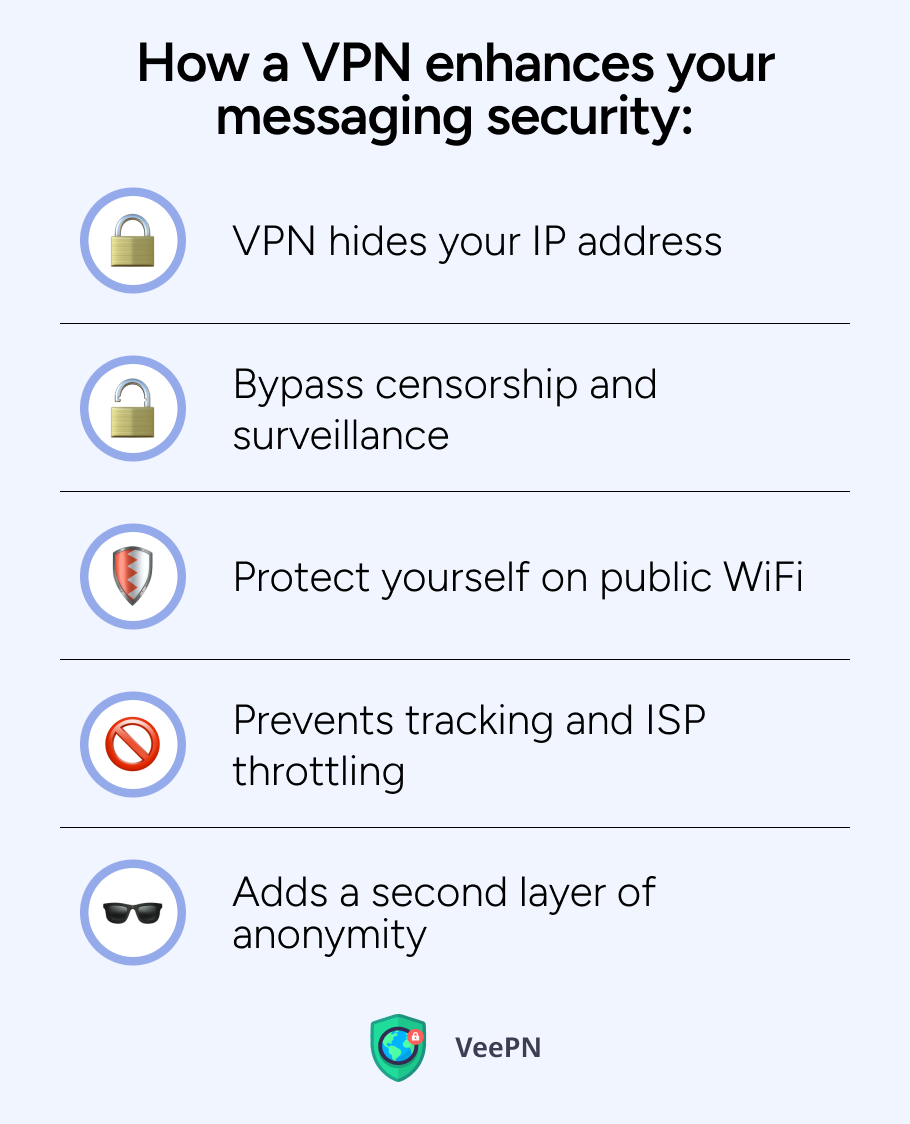
🔐VPN hides your IP address. With an active VPN app, every time you use a messaging app, it logs your IP address at the location of a remote server you’re connected to. In such a way, nobody can detect your real whereabouts.
🔐Bypass censorship and surveillance. When apps such as Signal or Telegram are blocked or monitored in your country, a VPN will provide you with secure and anonymous access. A VPN protects your conversations from government-level surveillance by encrypting all your traffic while directing it through a server in a different region.
🔐Protect yourself on public WiFi. The public WiFi networks are typically dangerous as they can be exploited by hackers to intercept your traffic for stealing your banking credentials or leaking your communications. With a VPN connection, your device data becomes undecipherable because it gets encrypted and routed through a remote server.
🔐Prevents tracking and ISP throttling. Internet Service Providers (ISPs) track your service usage and they can reduce your bandwidth speed. When you use a VPN app, your ISP is unable to detect the applications and services you use or your data exchange volume because a VPN encrypts your connection and disguises your online activity.
🔐Adds a second layer of anonymity. Even if your messages are end-to-end encrypted (as with Signal), your metadata, such as connection times and IP addresses, can still be revealed. A VPN helps you cover those traces by anonymizing your entire browsing session, not just your messages.
Note: VeePN is a VPN service not intended to be used for conducting any illegal acts. Please remember to check whether there are any restrictions in your particular country before doing anything potentially questionable. Please be informed that if some action is illegal without using a VPN, it will also be illegal with its use.
Why VeePN is the best VPN for secure messaging
The protection of your Signal or Telegram messages implies you need to pick an appropriate VPN for robust security. VeePN offers a trailblazing privacy-protected service that protects user data while ensuring both fast performance and convenient user experience:
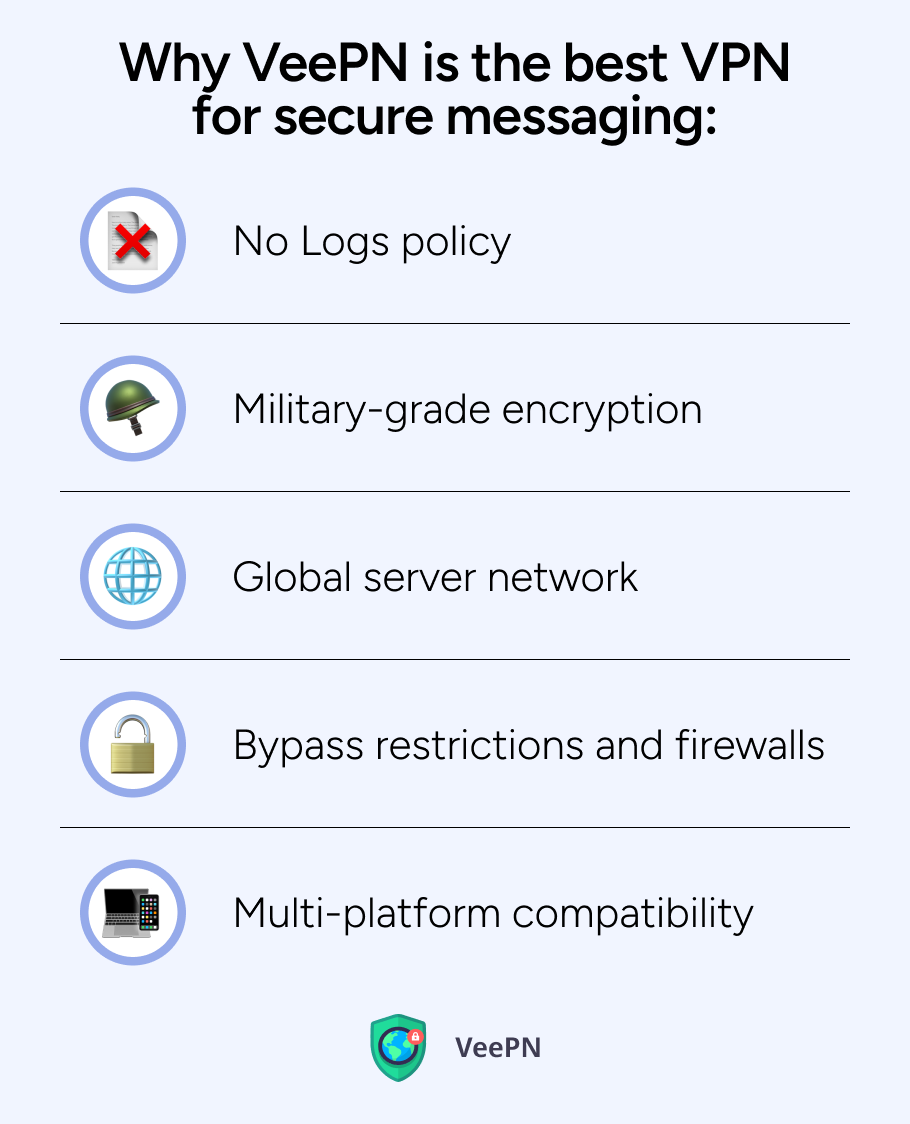
🛡️No Logs policy. We don’t collect and share your personal information for commercial purposes, so you can be sure your data won’t appear in spam databases.
🛡️Military-grade encryption. VeePN uses the AES-256 encryption standard that turns your traffic into a bunch of unreadable symbols that hackers won’t be able to decode.
🛡️Global server network. VeePN offers 2,500+ servers across 89 locations. No matter your purpose, whether it is accessing Signal or Telegram or seeking a quicker connection, VeePN offers servers located nearby to protect your traffic efficiently.
🛡️Bypass restrictions and firewalls. Trying to message from a school, workplace, or country with app bans? VeePN can help you bypass firewalls and geo-blocks effortlessly. Its obfuscated servers make your VPN traffic look like regular browsing activity, helping you slip past even strict censorship regimes.
🛡️Multi-platform compatibility. VeePN is compatible with all major platforms, including Android, iOS, Windows, macOS, Linux, Chrome, Firefox and even WiFi routers. With your VeePN account, you can secure up to 10 devices at once, so you’ll have 360-degree protection.
How to use VeePN with Signal or Telegram: A quick guide
Getting started with VeePN to secure your messaging apps is easier than you think. Whether you’re using Signal or Telegram, adding this extra layer of protection can be done in just a few simple steps:
Step 1: Sign up for VeePN
Head to VeePN’s official website and choose a plan that fits your needs. VeePN offers a free trial and affordable long-term options, all backed by a 30-day money-back guarantee.
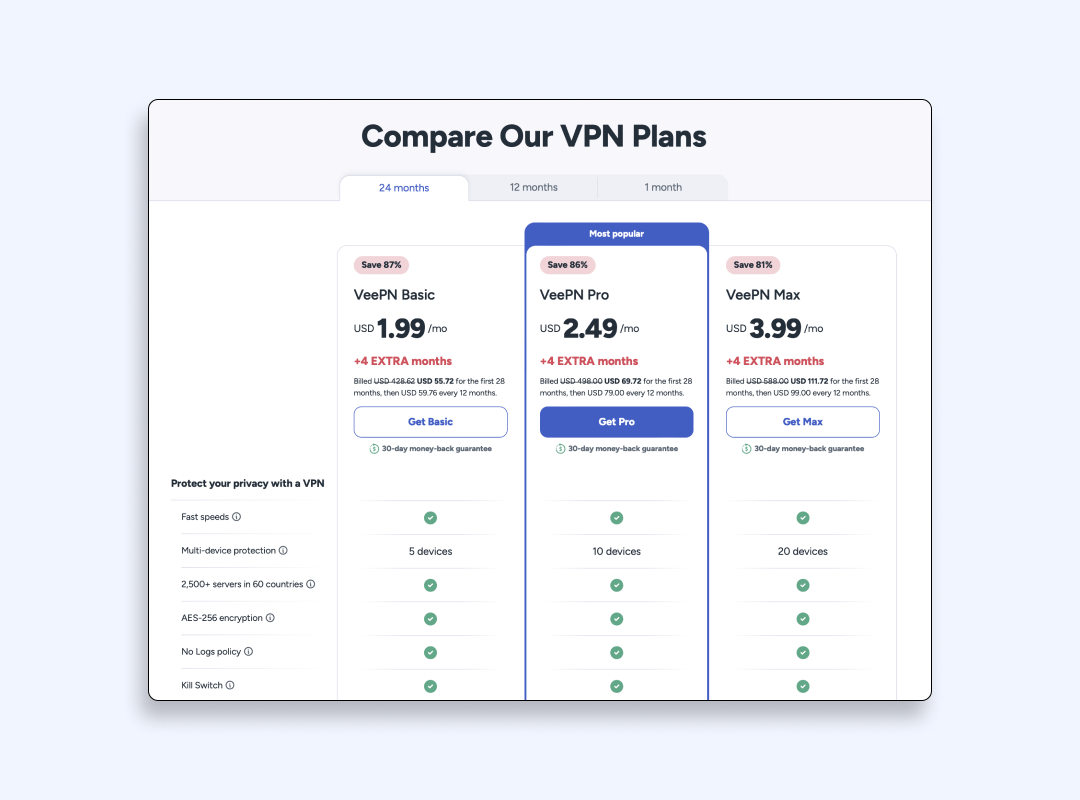
Step 2: Download and install the app
VeePN is available on all major platforms, including iOS, Android, Windows, macOS, and browser extensions. Simply download the app for your device and follow the installation instructions.

Step 3: Log in and choose a server
Once installed, open VeePN and log in using your credentials. Then select a server, ideally one close to your location for optimal speed or one in a region where Signal and Telegram are freely accessible.
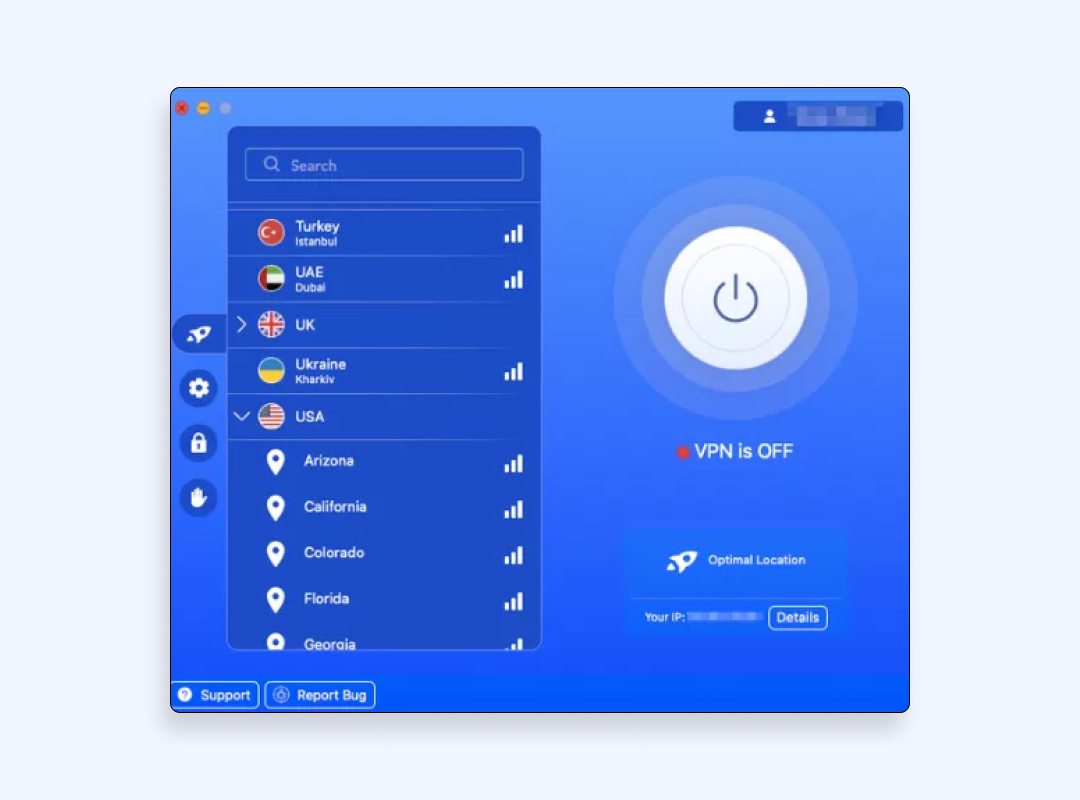
Step 4: Connect to the VPN
Tap or click the “Connect” button. Within seconds, your internet traffic will be encrypted and rerouted through your chosen server, hiding your real IP and securing your connection.

Step 5: Open Signal or Telegram
With VeePN active, open your messaging app and start chatting. Now, both your messages and your connection are shielded from surveillance, censorship, and ISP tracking.
Pro tips for maximum security:
- Use Signal’s built-in safety features like disappearing messages and registration lock.
- In Telegram, prefer Secret Chats for end-to-end encryption.
- Combine both apps with VeePN when using public WiFi or traveling abroad.
- Regularly update all apps to ensure you’re protected from the latest vulnerabilities.
Final verdict: Which app should you choose?
Your conversations should belong to you and you only. In a time where prying eyes are everywhere, tracking, logging, and snooping on your every move, VeePN puts the power back in your hands. So if you’re catching up with loved ones, rallying for a cause, or just browsing in peace, don’t gamble with your privacy. Lock it down and stay in control.
Get started with VeePN today and enjoy safe, unrestricted, and truly private communication wherever you are.
FAQ
Signal is generally considered more secure than Telegram because it employs end-to-end encryption by default for all chats, and its code is fully open-source for transparency. Telegram, while it does offer end-to-end encrypted “secret chats,” does not enable them by default, and its server-side code is not publicly available.
Some people might choose not to use Signal because it requires a phone number for registration, potentially impacting anonymity. Its reliance on a central server can also be a drawback, as it creates a single point of failure. Additionally, while Signal is open-source and very secure, some users may prefer other platforms with features or design choices that better meet their specific needs.
Yes. For instance, Signal has been reported blocked (or effectively banned) in China, and it has faced restrictions in countries like Iran. The situation can change over time, as governments may impose or lift bans depending on their regulations and policies, so it’s best to check local sources if you’re traveling or living abroad.
VeePN is freedom
Download VeePN Client for All Platforms
Enjoy a smooth VPN experience anywhere, anytime. No matter the device you have — phone or laptop, tablet or router — VeePN’s next-gen data protection and ultra-fast speeds will cover all of them.
Download for PC Download for Mac IOS and Android App
IOS and Android App
Want secure browsing while reading this?
See the difference for yourself - Try VeePN PRO for 3-days for $1, no risk, no pressure.
Start My $1 TrialThen VeePN PRO 1-year plan






